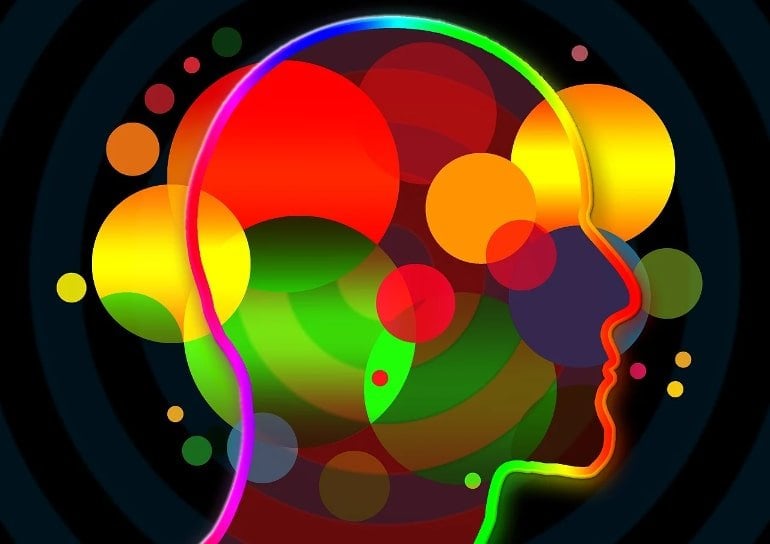Summary: People with schizophrenia struggle to manage low-level negative emotions as the negative emotions increase. Those with schizophrenia are less likely to employ coping strategies when stressed than those without the disorder, causing an escalation in their negative emotions.
Source: University of Georgia
A person with schizophrenia typically experiences more negative emotions and has more stressors than average.
A new study by University of Georgia psychologists has revealed a surprising finding that could help those who struggle with the illness: While people with schizophrenia tend to manage low-level negative emotions, they struggle to do so as those negative emotions increase.
People regulate their emotions to get from one feeling to a more preferred state, whether that is a return to calm, a move toward happiness, not feeling quite as angry, or leveraging a different emotion entirely.
Using clinical data from outpatients diagnosed with psychotic disorders and a control group, the study focused on the identification stage of emotion regulation and how the process differs. The researchers used a scale that translates to 1-10 for levels of negative emotion, with 10 representing the highest state of anxiety or emotional distress.
“The idea of identification in a healthy person tracks as you would expect: As negative emotion increases, they’re more likely to manage that,” said Ian Raugh, doctoral candidate and lead author on the new study. “At lower levels, say 1 or 2, you’re probably not going to do anything to change it. But as the level of negative emotion goes up, a healthy person is much more likely to engage in efforts to change how they are feeling.”
However, the researchers found that emotion regulation does not ramp up in the same way in people suffering from schizophrenia.
At higher stress levels, a healthy person works to manage their emotions, whereas someone with schizophrenia won’t or can’t do that.
“They’re actually less likely. That’s really the abnormality, that people with schizophrenia don’t seem to be trying to manage their emotions as much when their emotions are really high,” he said.
Raugh said sufferers of schizophrenia are less likely to employ coping strategies or emotion regulation to make themselves feel better. And as situations escalate in a negative direction, they become less likely to try to change the situation for the better.
“The terms we use in psychology are ‘learned helplessness’ or ‘defeatists beliefs,” where people think ‘oh, it’s not going to work even if I try so why bother,” which is common in depression as well. And so, there’s that aspect probably driving less attempts at higher levels.”

Researchers also weighed the possibility that people with schizophrenia are simply exhausted. Because they’re also regulating when negative emotion is low, they might be expending their effort when it’s least effective to do so or when they experience the fewest benefits. And so, when their emotions are really intense, it’s a lot harder.
“A lot of that comes down to they’re not regulating as much when it would be most advantageous to do so,” Raugh said. “Our future studies will try to understand more about why they would regulate less at higher levels.”
“Our next goal is to determine whether the same abnormality exists in youth at risk for schizophrenia,” said Gregory Strauss, associate professor of psychology, director of the UGA Clinical Affective Neuroscience Laboratory, and senior author on the study. “Heightened stress reactivity has long been seen as a key risk factor, but these results suggest that regulating that stress response must also be considered. If the same problems are also present years before the illness onset, tailored psychological treatments may have promise for preventing schizophrenia.”
About this emotional regulation and schizophrenia research news
Author: Alan Flurry
Source: University of Georgia
Contact: Alan Flurry – University of Georgia
Image: The image is in the public domain
Original Research: Closed access.
“Deconstructing emotion regulation in schizophrenia: the nature and consequences of abnormalities at the identification stage” by Ian M. Raugh et al. European Archives of Psychiatry and Clinical Neuroscience
Abstract
Deconstructing emotion regulation in schizophrenia: the nature and consequences of abnormalities at the identification stage
Existing evidence suggests that emotion regulation is abnormal in schizophrenia and associated with undesirable clinical outcomes. However, this literature is based predominantly on trait self-report and does not indicate which stages of emotion regulation (identification, selection, implementation) are impaired.
The current study focused on determining the nature of abnormalities at the identification stage using ecological momentary assessment (EMA). Participants included clinically stable outpatients with schizophrenia (SZ; n = 48) and healthy controls (CN; n = 52) who completed 6 days of EMA. The EMA surveys assessed emotional experience, emotion regulation, and symptoms.
Results indicated that SZ identified the need to regulate at a higher rate than CN. Specifically, SZ displayed an inefficient threshold for identifying the need to regulate, such that they regulated too much when negative affect was low and too little when negative affect was high.
Emotion regulation effort exertion was also inefficient, such that effort was too high at low levels of negative affect and too low at high levels of negative affect in SZ. These identification stage abnormalities also demonstrated differential associations with positive and negative symptoms. Findings suggest that identification stage abnormalities may create a bottleneck that feeds forward and impacts subsequent stages of emotion regulation in SZ that are critically related to symptoms.
Targeting the psychological processes underlying these identification stage abnormalities might offer a novel means of treating positive and negative symptoms in schizophrenia.






